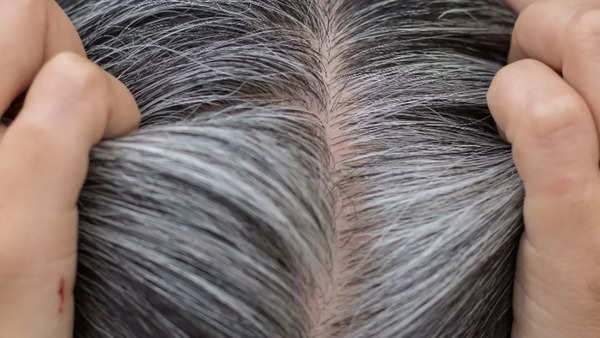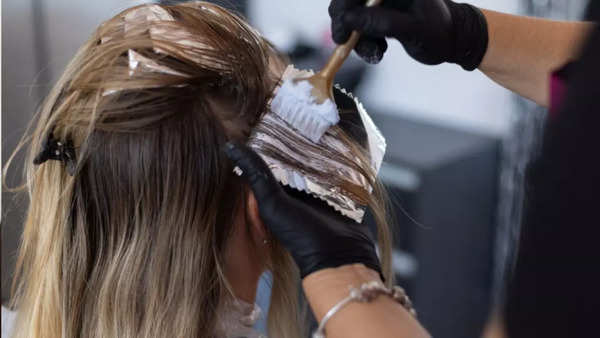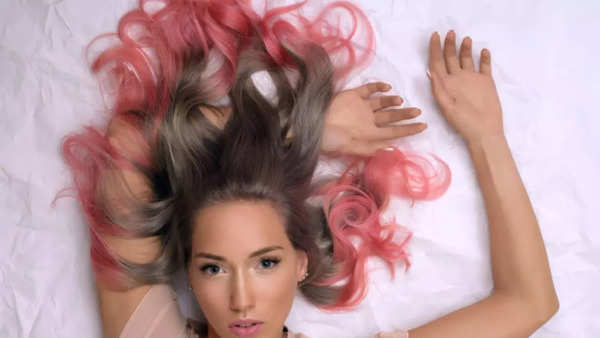Colouring your hair is a popular way to change up your look or cover grey strands. However, there’s a common concern that dyeing hair might contribute to more greying over time. While hair dye itself doesn’t directly cause your hair to grey faster, it can lead to other factors that may accelerate the appearance of grey, such as hair damage and scalp health issues.Let’s explore how hair colouring interacts with the natural greying process and how you can minimise damage to keep your hair healthy and vibrant.
How does hair turn grey?

Grey hair is a natural part of the ageing process, caused by the gradual reduction of melanin—the pigment responsible for hair colour. As you age, the pigment-producing cells in your hair follicles (called melanocytes) slow down and eventually stop producing melanin. Without this pigment, your hair loses its colour and turns grey or white.
Genetics plays the most integral role in how and when one’s hair becomes grey. External conditions such as stress, diet, and sometimes even a medical condition may give certain people grey hair faster, but dyeing your hair does not trigger more grey growth.
Will colouring your hair make greying faster?
While hair dye doesn’t cause grey hair, colouring can affect the overall health of your hair, which may give the impression that your greying process is accelerating. Here’s how:
Hair damage from dyeing
Permanent hair dyes are usually quite harsh on the hair cuticle. The cuticle is the outermost layer of your hair, and repeated colouring causes it to weaken or even lift off in bits, leading to breakage, dryness, and frizz. Damaged hair may not have the same shine and smoothness as healthy hair, which can make grey strands stand out more, creating the illusion of faster greying.
Scalp health
Chemical hair dyes, especially those with ammonia or peroxide, can also irritate the scalp and may cause dryness or sensitivity. A healthy scalp is necessary for maintaining the health of your hair follicles and the production of strong, healthy hair.
How to minimize hair colour damage

If you love changing up your hair colour but want to minimize the damage and maintain healthy hair, here are some tips to protect your hair while keeping it vibrant:
Choose a gentler dye formula
Opt for ammonia-free or semi-permanent dyes, which are gentler to your hair. These dyes do not cause damage to the cuticle, promoting it to retain moisture and avoiding excessive dryness. Semi-permanent dyes to cover grey hair are gentler although less durable than the permanent formulas.
Deep conditioning
Deep conditioning will repair the damage that occurred due to colouring and restore natural moisture to your hair. Apply a rich, nourishing conditioner or hair mask once a week for moisturised hair. Look for products that contain ingredients like argan oil, keratin, or shea butter, which help to strengthen and protect the hair shaft.
Reduce the frequency of dyeing
Proper dyeing can lead to over-processing and more damage. Try spacing your hair colouring sessions and giving your hair a chance to recover in between. If you’re covering greys, you can opt for root touch-up products to target only the regrowth and avoid colouring the entire head of hair every time.
Use heat protection
Heat styling can be quite stressful on your hair, and when this happens to already chemically altered hair, it can cause a lot more damage. To prevent this, always apply a heat protectant spray or serum before the use of any heat-styling tools. This will help retain the strength and integrity of your coloured hair.
Avoid over-washing
Washing your hair too often can strip it of its natural oils and further weaken it, especially after colouring. Wash your hair no more than twice or thrice a week, and use a sulfate-free shampoo that is gentle on coloured hair.
Protect your hair from sun damage

Just as UV rays can damage your skin, they can also affect your hair, causing it to fade and become brittle. When spending time outdoors, wear a hat or use a UV-protectant hair spray to shield your coloured hair from the sun’s harmful rays.
Get regular trims
Regular trims are essential for removing split ends and keeping your hair looking healthy. This will also prevent the appearance of damaged, frizzy hair, which can make your grey strands more noticeable.
6 Best oils for navel massage to boost health naturally






